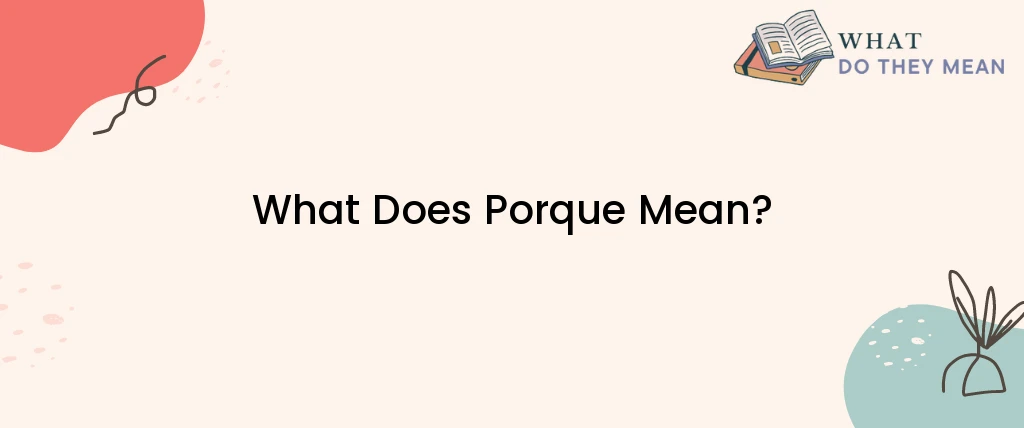“Porque” is a conjunction in Spanish that means “because” or “why.” “Porque” is a common conjunction in the Spanish language that is used to introduce a reason, explanation, or cause for something. Understanding its meaning and usage is important for anyone learning or using the Spanish language.
Definition
The word “porque” is composed of two parts: “por” and “que”. Por” is a preposition that can have several meanings, including “because of,” “through,” “by,” or “for.” “Que” is a conjunction that means “that” or “which.” Together, “porque” means “because” or “why.
Usage
“Porque” is used to connect two clauses or ideas and to explain the reason or cause for the second clause. It can be used to answer the question “why?” or to give an explanation for something.
For example:
- “No fui al cine porque estaba enfermo.” (I didn’t go to the cinema because I was sick.) In this sentence, “porque” is used to give the reason why the person did not go to the cinema.
- “¿Por qué no fuiste al cine?” (Why didn’t you go to the cinema?) In this question, “por qué” is used to ask for the reason or explanation for the person not going to the cinema.
Different Ways to Use “Porque”
There are different ways to use “porque” in Spanish, depending on the context and the type of sentence. Here are some examples:
“Porque” as a Reason
“Porque” can be used to give the reason or cause for an action or event. It is often used in the middle or at the beginning of a sentence.
- “No puedo ir a la fiesta porque tengo que estudiar.” (I can’t go to the party because I have to study.)
- “Porque llovió, no pudimos salir.” (Because it rained, we couldn’t go out.)
“Porque” as a Conjunction
“Porque” can be used as a conjunction to connect two independent clauses. In this case, it can be translated as “because” or “since.”
- “No me gusta el fútbol, porque no entiendo las reglas.” (I don’t like soccer because I don’t understand the rules.)
- “Ella no llegó a tiempo, porque había mucho tráfico.” (She didn’t arrive on time because there was a lot of traffic.)
“Porque” as a Question
“Porque” can also be used as a question word, similar to “why” in English. In this case, it is written with an accent mark (“¿Por qué?”) to distinguish it from the conjunction “porque.”
- “¿Por qué estás enojado?” (Why are you angry?)
- “¿Por qué no viniste a la reunión?” (Why didn’t you come to the meeting?)
“Porque” in Negative Sentences
When “porque” is used in a negative sentence, it is often replaced with “porque no” or “porque no + verb” to mean “because not” or “because I/you/we/they didn’t.”
- “No pude ir al concierto porque no tenía dinero.” (I couldn’t go to the concert because I didn’t have money.)
- “No compré el vestido porque no me gustaba.” (I didn’t buy the dress because I didn’t like it.)
Conclusion
In conclusion, “porque” is a versatile conjunction in the Spanish language that is used to connect two clauses or ideas and to give the reason or explanation for the second clause. It can be used in different ways, depending on the context and the type of sentence. By understanding its meaning and usage, you can effectively communicate in Spanish and better understand the language.

As a researcher, I am curious and driven by the pursuit of knowledge. I approach my work with a critical eye, carefully evaluating sources and methods to ensure that my findings are accurate and reliable. Whether delving into scientific studies, historical records, or cutting-edge technologies, I am always seeking to expand my understanding and make new discoveries. I am dedicated to uncovering new insights and finding solutions to complex problems, and am driven by a passion for uncovering the truth.

